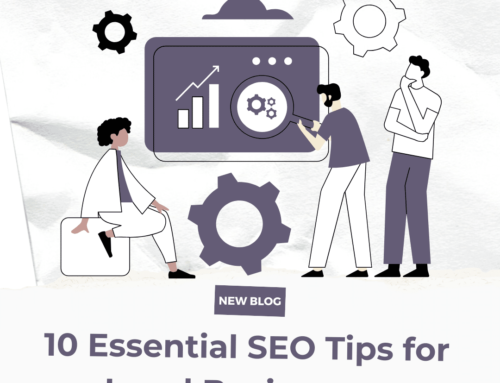For many business owners, Search Engine Optimization (SEO) is a one-time “project” that they do (or pay someone else to do), and they think that once it’s done, it’s done. While a major SEO overhaul can cause dramatic gains if you haven’t updated your website in ages, that doesn’t mean SEO is just something you can set and forget: SEO is an ongoing task that requires continued attention in order to see optimal results.
If you don’t continuously attend to your website’s SEO, you risk falling behind your competition, getting bitten by algorithmic updates, and missing out on opportunities to see even further gains in page views, leads generated, and overall sales. Here are 4 reasons why SEO work is never finished, and what you can do to keep up:
The Algorithm is Always Changing
While Google’s Search algorithm can be frustratingly opaque at times, one thing that’s no secret about it is that Search is always updating, and that has a strong impact on which sites see the greatest search query returns.
Just a month ago Google rolled out its “Helpful Content Update,” which was a large update aimed at rewarding sites that offered useful information to site visitors, and (among other changes) deprioritized results that left Search users wanting. The end result? Sites with content that was natural, informative, and accurate are seeing boosts to their search rankings. On the flip side, sites that offered clickbait headlines, claimed to answer questions they didn’t answer, or used language that focused so much on keyword stuffing at the expense of being off-putting to human readers saw declines in their rankings.
But Search algorithm changes aren’t just limited to the occasional big updates that make headlines around the tech blogs. Search rolls out smaller, less-expansive updates as frequently as twice a day, meaning that every single day, your SEO practices are theoretically getting more and more out of date. If you aren’t keeping up with what the Search algorithm is looking for and updating your website and your content strategy accordingly, you’re falling behind.
Benefits in New Forms of SEO
Additionally, while we think of “SEO” as just one concept, it really ends up being so much more than that. Just like “engineering” is a broad umbrella term that covers so many professions and specialties, “SEO” actually encompasses several different areas that all serve the same end purpose: making your website rank higher.
On-Page SEO is often what we think of when we hear the term SEO. That is, it covers all the little (or big) changes you make to a web page that helps it stand out in the search rankings. Copy written in a natural voice, high-quality images, proper keyword and meta-tag usage, useful and usable content, all of this helps pages rank higher, but it doesn’t end there. Off-Page SEO refers to how you can increase your ranking by being considered a reliable source through backlinks and other measures of trust. Technical SEO is the practice of optimizing the technical aspects of your website to help the algorithm better index your site–think increases to site speed, mobile responsiveness, up-to-date site infrastructure, etc. And Local SEO optimizes your page for local searches through options like setting up a Google My Business/Google Business Profiles.
For most small business owners, SEO can feel like an overwhelming challenge, and making significant updates to just one of these SEO areas can (and should!) be seen as an admirable goal. But it also means that once you’ve hit one, you’re not done–next time you come back to the SEO table, look at optimizing in one of these other areas to keep improving your search outcomes.
You Always Need More (and Better) Content
Content marketing is one of the go-to website marketing strategies nowadays, and for good reason–not only does writing compelling and useful content and blog posts offer you the chance to show your expertise and build trust with your potential customer base, but in doing so, it helps you rank more highly in Google’s Search results too. While many of us don’t automatically think of writing blogs as ongoing SEO maintenance, it absolutely is–regular posting not only gives your website more content for people to explore, but it shows Google that you’re active and relevant.
Every blog you write or page content you update should always be done with the latest SEO best practices in mind–this should be fairly obvious, as each new piece of content is meant to help your business grow in every way possible! But how often do you think about updating old content? About going back to blog posts from 2 or 3 years ago and updating them to fit new SEO strategies? With the algorithm changing constantly, your website can see notable benefits from occasionally going back to bring old content more in-line with the best practices of today.
You Need to Out-Rank Your Competitors
If you’re reading this, you’re likely a small or local business owner–maybe tech isn’t your forte, but surely you know a thing or two about running a successful business, so let’s talk business: One of the fundamental rules of business is to always be aware of what your competitors are doing. You want to know if they’re rolling out new products, updating their branding, running sales, etc, so that you can look at your own business and decide if and how you need to respond to stay competitive. One thing you may not realize is that your competitors are almost certainly updating their website and SEO practices regularly, which means you risk losing ground.
Especially with local SEO becoming more and more relevant, what your closest competitors are doing with their web presence is something you need to compete with in order to keep your Google Search rankings high and in order to continue growing and expanding your business.
Whether you just learned the term SEO or are looking to bring your business to the next level, Skol Marketing’s team is here to help. For one-on-one guidance or to discuss how we can help your company find your audience on Google, please don’t hesitate to contact the local SEO experts at Skol Marketing.





